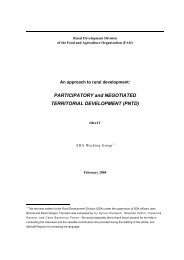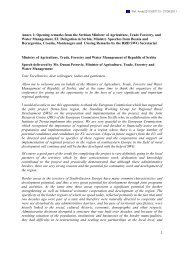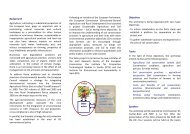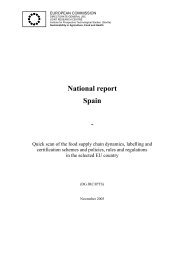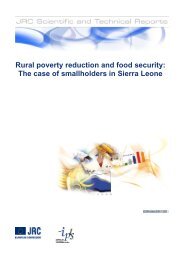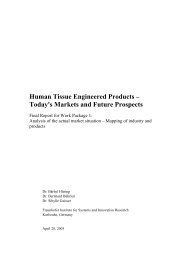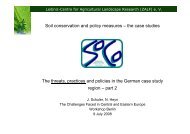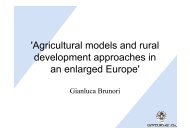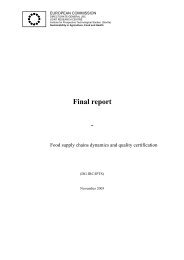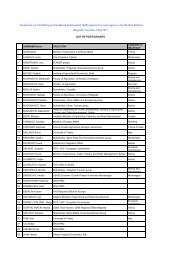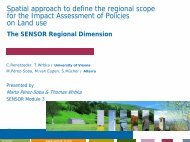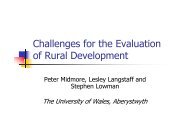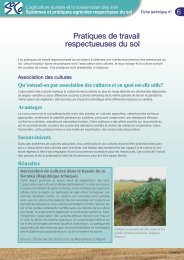SIERRA LEONE maq 4ª.indd - agrilife - Europa
SIERRA LEONE maq 4ª.indd - agrilife - Europa
SIERRA LEONE maq 4ª.indd - agrilife - Europa
Create successful ePaper yourself
Turn your PDF publications into a flip-book with our unique Google optimized e-Paper software.
need to undertake complimentary activities<br />
which could include cash crops such as sugar<br />
cane, oil palm and/or citrus. Equally they should<br />
attempt to improve on their off-farm value added<br />
activities, which are in line with the Government<br />
development strategy for the rural areas of Sierra<br />
Leone. In this respect, it is central to underline<br />
that on one hand the cultivation of the most<br />
frequently exported cash tree crops which are<br />
coffee and cocoa cannot be spread to all regions,<br />
while on the other hand, staple cropping plays<br />
an important role in reducing food consumption<br />
uncertainties and increase food security.<br />
7.4 Insights for Technical Assistance<br />
Insights or future technical assistance<br />
programmes in Sierra Leone are discussed in this<br />
sub-section. Ideas expressed in this sub-section<br />
may be relevant also for EU food aid policy in West<br />
Africa in general, or other areas under tropical<br />
agriculture. Three main aspects are considered<br />
and are discussed in detail: (i) reduction of crop<br />
production losses & enhancement to access to<br />
improved technology, services and inputs; (ii)<br />
support to off-farm income activities and (iii)<br />
explore alternatives to the current agrarian system<br />
and fostering of market integration.<br />
Reduction of pre- and post-harvest losses<br />
& enhancement of smallholders’ access to<br />
improved technology, services and inputs<br />
Given the high percentages of output loss in<br />
both food and tree cropping, one approach would<br />
be to continue with supporting yield enhancing<br />
measures under the current shift cultivation<br />
system. Although, it should be acknowledged<br />
that the sustainability of such an agrarian system<br />
is questionable both in Sierra Leone and other<br />
tropical agricultural areas worldwide. Moreover,<br />
smallholders could be involved in more specific<br />
measures aiming at yield increase, pest control,<br />
labour saving technologies, and increase<br />
investment into research and extension service<br />
especially for rice and coffee/cocoa production.<br />
Provision and access to harvesting machinery,<br />
storage capacity, processing equipments would<br />
also help to reduce post-harvest losses.<br />
Support to off-farm income activities<br />
Sustainability of smallholders in Sierra Leone<br />
depends on other income sources. Family members<br />
who work outside and send remittances constitute<br />
a critical source for farm household subsistence.<br />
Likewise, integration to other business sectors in the<br />
rural areas could also be considered (i.e. fishing,<br />
mining and/or sustainable forest management 49 ,<br />
which could also serve as an alternative to deter<br />
the ongoing deregulated forest exploitation<br />
observed during the project team’s validation visit<br />
in 2009). It would be relevant to analyse available<br />
diversification strategies both in terms of intercropping<br />
mechanism and inter-village trade or low<br />
scale manufacturing (i.e. crafting).<br />
Explore alternatives to the current agrarian<br />
system and fostering of market integration<br />
Although income calculations under<br />
the Peasant Farming approach indicate that<br />
a significant part of the surveyed farms are<br />
viable in the specific context of the village<br />
or chiefdom, sustainability in the long run<br />
is questionable under the current agrarian<br />
system in Sierra Leone. Therefore it is crucial<br />
to explore alternatives to the current system<br />
and the integration of smallholders to different<br />
markets. However, it should be stated that<br />
large capital-intensive estates is not the only<br />
route which may be taken in paths of agrarian<br />
change; an alternative is the transition from<br />
(semi)subsistence peasant farming to more<br />
commercial oriented family farming in a context<br />
of fully developed input and output markets<br />
(Friedmann, 1980 in Ellis 1993, p 54). However,<br />
a most important consideration is that of effective<br />
agronomic alternatives to the current slash and<br />
burn system as well as the way in which farmers<br />
49 For more on the economics of tropical deforestation refer<br />
to Barbier and Burgess (2001) and/or Cattaneo (2001)<br />
Rural poverty reduction and food security: The case of smallholders in Sierra Leone<br />
163



